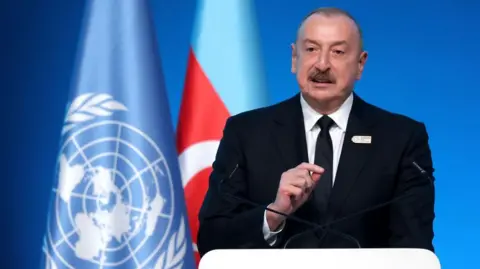UN climate talks 'no longer fit for purpose' say key experts
The United Nations' COP climate talks are "no longer fit for purpose" and need an urgent overhaul, key experts including a former UN secretary general and former UN climate chief have said.
In a letter to the UN, senior figures say countries should not host the talks if they don’t support the phase out of fossil energy.
This week the Azerbaijani president told world leaders gathered in his country for COP29 that natural gas was a “gift from God” and he shouldn’t be blamed for bringing it to market.
That came days after the BBC reported that a senior Azerbaijani official appeared to have used his role at COP to arrange a meeting to discuss potential fossil fuel deals.
The UN’s climate talks have made significant progress in recent years, despite the fact that unanimous agreement is needed among almost 200 countries to take action.
The Paris climate agreement, signed in 2015, outlines a long-term plan to rein in rising temperatures, as countries strive to keep that rise under 1.5C this century.
They have also agreed to transition away from fossil fuels in energy systems, and to treble renewable power by 2030.
But while the authors of this letter recognise these achievements, they feel that the slow-moving COP process is “no longer fit for purpose” in dealing with a fast-moving climate crisis.
"Its current structure simply cannot deliver the change at exponential speed and scale, which is essential to ensure a safe climate landing for humanity," said its signatories. They include former UN Secretary General Ban-Ki Moon, former UN climate chief Christiana Figueres and former president of Ireland Mary Robinson.
The authors are concerned that the current COP process is not able to make change happen quickly or able to force countries to act.
At last year’s COP28 meeting in Dubai all countries agreed to “transition away from fossil fuels in energy systems.”
But 12 months later emissions of warming gases have increased once again, up by almost 1%.
Scientists say these emissions need to fall by 42% by the end of this decade to avoid a global temperature rise in excess of 1.5C, considered the threshold to far more dangerous impacts than we are seeing at present.
One of the authors of the letter, Christiana Figueres, later qualified her support for reforms, saying they had been “misinterpreted in today’s context.”
In a statement she said: “The COP process is an essential and irreplaceable vehicle for supporting the multilateral, multisectoral, systemic change we urgently need. Now more than ever.
“We are committed allies to and advocates for this process — and lend our total support to positive efforts underway to further strengthen it for the new era of implementation we are entering into.”
 Getty Images
Getty ImagesThe UN has yet to comment on the letter.
At the conference in Baku, negotiators from small island states were particularly concerned about any attempt to change the nature of the COP, where all countries are equal.
They worry that if decisions are made among the big emitters at forums such as the G20 group of richer nations, their small island voice will be excluded.
“We're not a part of those discussions,” said Micahi Robertson who’s an adviser to the Alliance of Small Island States at these talks.
The letter has been prompted by growing concerns about some of the countries chosen to host COP talks and their ability to deliver a significant advance in the fight against rising temperatures.
Just before the latest conference started, a secret recording showed the chief executive of Azerbaijan's COP29 team, Elnur Soltanov, discussing "investment opportunities" in the state oil and gas company with a man posing as a potential investor.
At the start of COP29, the country’s authoritarian leader, Ilham Aliyev, defended Azerbaijan’s current exports of gas and plans to expand production by a third in the next decade.
“It's a gift of God,” he told an audience in Baku.
“Every natural resource whether it's oil, gas, wind, sun, gold, silver, copper, all that are natural resources," he said.
"And countries should not be blamed for having them and should not be blamed for bringing these resources to the market because the market needs them, the people need them."
The use of oil and gas are major causes of global warming, as they release planet-warming gases like carbon dioxide when they are burned.
President Aliyev also hit out at France for carrying out colonialist “crimes” and “human rights violations” in overseas territories.
Such strongly expressed views are extremely rare from the leader of a COP host, where the aim is to build consensus on how to tackle rising temperatures.
The authors of the letter are also concerned by the selection process for hosting COPs. Azerbaijan followed on from another major oil producer, the United Arab Emirates, which held the conference in Dubai last year.
The authors say that host countries “must demonstrate their high level of ambition to uphold the goals of the Paris agreement."
They also want smaller, more frequent COPs with clear accountability for the promises that countries make.
